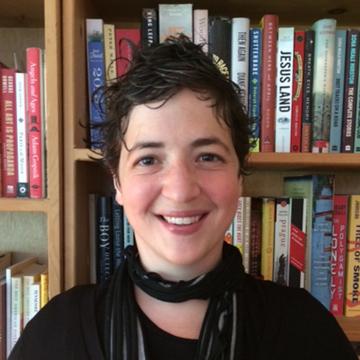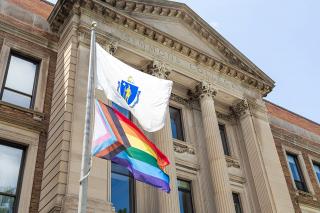"Over the past decade, there has been an all-out war on trans folks," observes Lena Zuckerwise, Associate Professor of Political Science and International Relations. "Most recently, trans children are the newer targets on the part of the [political] right."

Zuckerwise teaches graduate and undergraduate courses in women's and gender studies, including a course specifically on trans politics and theory. Looking back, she sees the success of the marriage equality movement — with Obergefell v. Hodges in 2015 — as a turning point in the shifting political landscape of LGBTQIA+ rights and the response of right wing policy efforts.
"Up until 2015, gay marriage had been the target of the right. Following this decision, the right surmised that they had lost this battle in the culture war. So they sought out a new strategy, a new galvanizing issue that could consolidate its base."
In 2016, the infamous "bathroom bill" was passed in North Carolina, which forbade trans people from using bathrooms aligned with their gender identity. There have been similar bills since then. "In 2023, there are 556 anti-trans bills proposed in 45 states," says Zuckerwise. "83 have passed and 369 are currently active." In addition to bathroom bills, these include trans participation in youth sports and access to gender-affirming healthcare.
"I'm a political science person, so I think of the politics of it," says Zuckerwise. "For many people on the right, the gender binary occupies a dominant foundational position in the social order. People have incredibly deep investments in the connection between sex and gender, and they have exploited anxieties in a lot of pernicious ways, using fear tactics meant to galvanize support for their side." These include fear mongering, claiming that kids will learn that they should become a different gender in school, or suffer proselytizing from so-called woke liberals. "It's a campaign of disinformation — essentially, hate — that's meant to drum up support for legislative initiatives."
What can allies do to support the LGBTQIA+ community, in light of these changes?
"The what is easier than the how," says Zuckerwise. "For me, how to help always begins with listening to Black, queer, and trans activists and trans and queer folks of color from marginalized communities." She also urges an understanding of intersectionality, that no operation of power exists singularly in isolation. "Identity categories — like Asian American working class — work with each other to produce the subject experiencing discrimination and oppression," Zuckerwise explains. "Looking at LGBTQ rights, gender identity, class position and racial categories really matter. When people want to be allies and accomplices, approach the people you are trying to support with that intersectional perspective in mind." She encourages people to invest time and money in BIPOC-led activist groups.
"It's important to seek out opportunities to interact with people who occupy identities not shared by dominant groups," urges Zuckerwise.
Luckily, she sees a ray of hope for the future at Simmons.
"Simmons students, more so than in a lot of other places, are gifted at questioning foundational assumptions that often serve to support dominant groups and their power," says Zuckerwise. "Simmons students are undoing the idea that dominant power is inevitable, that it is monolithic. For me, that's where the possibility for political change lives. The presence and activism of trans students on our campus, along with the lively political and social activities of the Trans and Non-binary Collective (TANC), contributes to undoing the idea that the gender binary is real. That is the air we breathe, here at Simmons, to our benefit."
Jann Canero, Technology Service Center Lead, has observed many changes in the LGBTQIA+ community as a member of the baby boomer generation. "We grew up afraid, eyes in the back of our heads, afraid of family rejections," says Canero. "Now, in large part due to being at Simmons for 25 years, I have become comfortable in my own skin. I could not find 'the closet' if I wanted to. But still, the fear is creeping in, as is anger. Watching the deterioration of rights is bringing back the knot I carried in my stomach for years. Too many LGBTQIA+ people, especially youths, have been harassed, abused, blacklisted, dis-inherited, and worse."
Like Zuckerwise, Canero also notes that hope can be found in the younger generation. "My step-daughter (born in 1992), who came out after graduating high-school is just outraged, angry and has the attitude, 'oh, hell no. You will NOT legislate my existence back into the Dark Ages.' We both live for the day when being LGBTQIA+ or any other 'difference' is just a small part of who we are. Just as being short and stocky, differently abled physically, being neuro-diverse, having varying shades of skin coloring, and the list could go on and on."
Photo by Ashley Purvis

